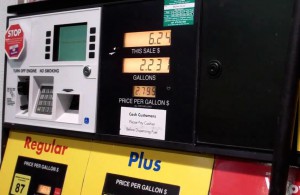A major pipeline that carries gasoline to the Eastern United States ruptured in Alabama, forcing part of it to shut down. The closure is threatening to drive up prices and create spot shortages of fuel along the Atlantic Coast and in the Southeastern United States.
A section of the Colonial Pipeline, which runs from Houston to New York, has been closed since Sept. 9, after a spill of roughly 250,000 gallons was discovered in rural Shelby County, Alabama.
The pipeline, one pipe of which has been severed, provides gasoline for an estimated 50 million people on the East Coast each day, according to company estimates. The cause of the leak has yet to be determined, according to the company’s most recent statement.
The pipeline’s operator has said full service will not be restored until the end of the week. The closure has forced suppliers to search for alternative ways to transport gasoline to the East Coast.
(Gas prices fall as summer driving season ends. For more, Click Here.)
Meanwhile, Colonial has said that more than 700 people were working around the clock to dig up the pipe, plug the leak, clean up the old mining property south of Birmingham and restore supply.
Colonial operates seven “stublines,” or shorter pipelines from Atlanta that transport gasoline to places like south Georgia, Nashville and Knoxville. Some gas stations have already run out of gas while there are reports of price gouging in some parts of Georgia.
(Click Here for more about Tesla, Mobileye pointing fingers at each other.)
Prices have yet to move much. They’re only up a penny or two in the last week in states such as Georgia, South Carolina and Tennessee, according to AAA.
But gas prices could spike by as much as 15 cents per gallon or more in those three states, as well as North Carolina and Virginia, in the next week according to GasBuddy.com analyst Patrick DeHaan.
(To see more about the $999 autonomous driving system, Click Here.)
For now, however, Gas Buddy’s data indicates that prices on average remain below the prices charged at the pump during the summer driving season in June July and August. Gas prices in the Southeast also haven’t moved much. Inventories of gasoline also remain high, according to AAA and the Energy Information Administration.


You have to wonder first off WTF it took them so long to be alerted to the spill, a inspector happen to be on his inspections and found a fuel smell in a coal mine is how they found it , WTF is all them meters and devices and pc’s on the damn pipeline for then. If you put in 500k gallons in one end and only 250k comes out they should have been alerted there was a difference in flow rates/gallons from beginning to end.This should have told them right away they had a rupture.With all the EPA BS safety guards WTF did it take a guy just on his normal flipping inspections to alert there is a leak!!!WTF is our great EPA when watching over these companies, taken bribes and turning their heads to ignore violations for a damn payday eh. Next why exactly do we have DOT driving laws? because truck drivers would drive half asleep and cause ACCIDENTS! now we are just going to say hey FU**K public safety let drivers drive till they fall asleep behind the wheel of 80,ooo pound of fuel. Lets leave it up to the drivers to decide eh…THEY ARE THE DAMN REASONS WTF WE HAVE DOT DRIVING LAW LIMITS ON COMMERCIAL VEHICLES DUH…They would not use common sense and stop driving when sleepy, now they somehow will WTF is wrong with these politicians.Next WTF ARE THE PICTURES OF THE RUPTURE or is this all BS to hike fuel profits!3 lines happen to rupture all close together…….Then there is that whole BS people raising fuel prices while there is state of Emergency going on …thats BS but no one seems to go after these station owners that do this BS…..Fuel they had in their tank was already bought but they get to rise fuel prices right away in a state of emergency WTF! See if I dont get fined and haled into court for charging people a lot more for generators/bottle water during long power outages or natural disasters…..
With all the technology we have wouldn’t you think they won’t led or could led have the pipe electronically monitored for leaks ????